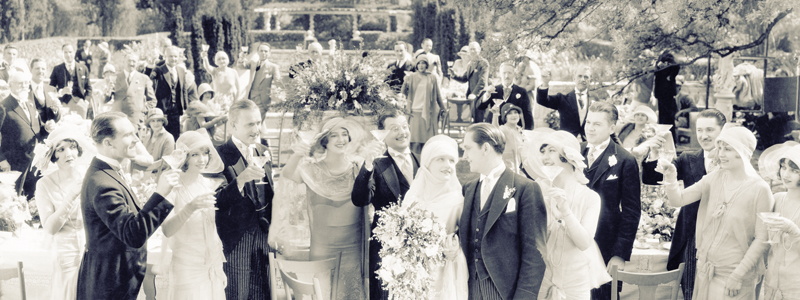
A few weeks ago, my college roommate got engaged. Although I’ve been to a handful of weddings for assorted relatives, this marks my first foray into the world of friends’ weddings and all of the various social events that accompany them. The array of engagement parties, bridal showers, bachelor/bachelorette parties, and other celebrations offer ample opportunities for friends and family members to make toasts or speeches in honor of the happy couple. As we enter the throes of wedding season, it seems an appropriate time for a refresher on some of the most important guidelines for formulating a successful wedding toast.
First and foremost, it is crucial to maintain a focus on the happy couple. No matter how close you may be to the bride, the groom’s third cousin—thrice removed—will not be entertained by your funny inside jokes. Any anecdotes you choose to share should focus on happy memories of the couple, even if you’re only a supporting character. As important as you are to the couple (you’re speaking at their wedding, after all), remember: it’s not about you. Along those same lines, by keeping your toast brief, you will greatly lower the risk that guests will flee to the bar while you’re only halfway through your monologue.
It’s also important to keep in mind who the bride and groom are and what they like. While it may seem funny to tell that embarrassing story about how drunk the bride got on their first date, she probably doesn’t want her grandparents to hear about how sick she got later that night. Keep your source material as PG as possible, and err on the side of caution when considering how people in the room might react. You never truly know how conservative a crowd you might be playing to until you make a college dance floor makeout joke.
In our minds, we all like to believe that we can stand up in front of a room full of 250 drunk strangers and deliver a beautiful toast that recreates the standard for prose. In actuality, public speaking is terrifying. There is no shame in writing out every word to your speech, down to when you take pauses, and rehearsing it plenty of times before the big day. Try to save any serious drinking until after you’re done speaking, and stick to a glass or two of champagne beforehand if you feel you need to calm your nerves.
Wedding toasts, like any other celebratory address, customarily end with a clink of the glass. This tradition has origins both in ancient Greece, where this display was a sign of good faith that you were not poisoning your companion (as any liquid would spill back into the other glass), and in many other cultures where the sound was thought to ward off evil spirits. Either way, this practice is largely a superstition today—not to mention a prime opportunity for spills on black tie dresses, or, worse, broken glass sliding across a dance floor—and it is just as polite to simply raise a glass to conclude your address.
Whether a toast is filled with inspirational quotes, hilarious anecdotes, or simply best wishes for the couple’s future, most weddings are enhanced by the mere presence of these small insights into the everyday life of a couple. By keeping any speech short, sweet, and to the point, it is nearly impossible to elicit anything but warm hugs from the bride and groom.
The ideal toast, outlined:
Open with a joke—not too corny, not too raunchy, just slightly sappy.
Share an anecdote about each member of the couple. Don’t force it if you don’t have much material on both of them.
Include a story that shows how they’re great for each other. (If it references themes from the first two stories, bonus.)
Offer thoughtful, yet brief, best wishes.
Cheers to the happy couple.
Run time: 1:30
Now that that’s done, you deserve a drink.
Colette Bloom is a writer living in New York. In the eighth grade, she read the first half of Atlas Shrugged but then it fell out of her backpack and the spine cracked and she figured it would be easier to just watch TV. Follow her on Twitter @cobloom.

